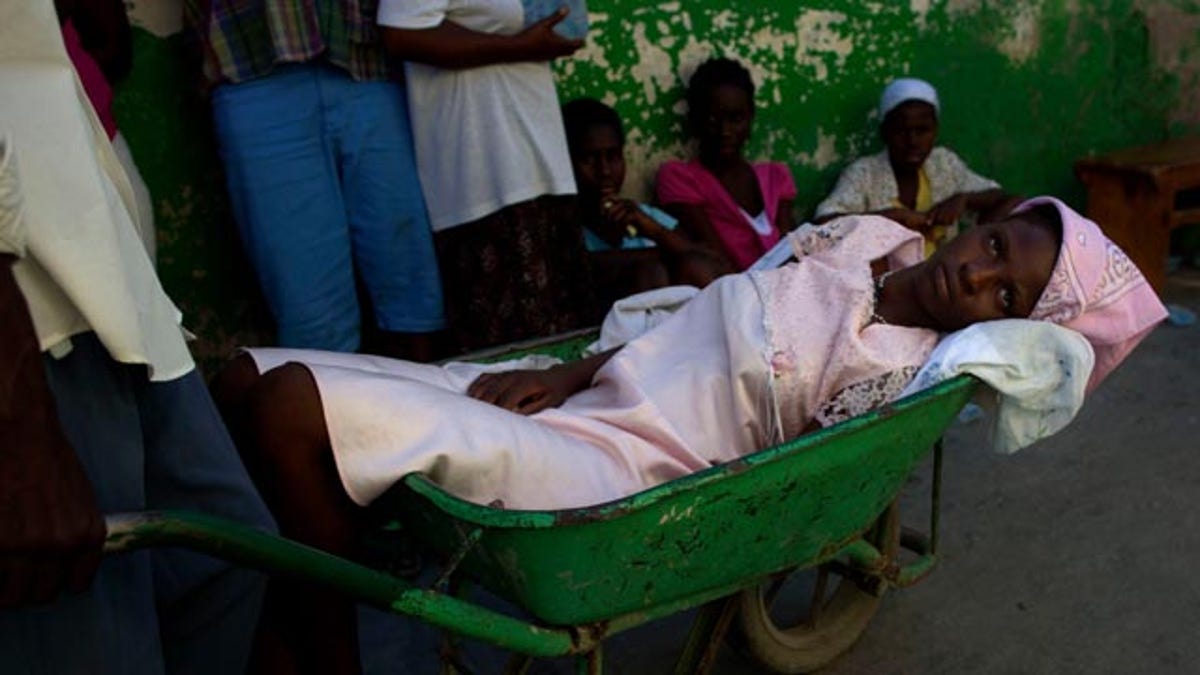
Nov. 17: A woman suffering cholera symptoms is pushed in a wheelbarrow to St. Catherine hospital in Port-au-Prince, Haiti. Haiti’s cholera epidemic has killed at least 1,000 people and hospitalized thousands. (AP)
PORT-AU-PRINCE, Haiti – Anti-U.N. rioting fueled by cholera fears scaled down in northern Haiti on Wednesday, but a third demostrator was killed in clashes and small-scale demonstrations took to the streets of the capital.
Florida health officials, meanwhile, confirmed a case of cholera in a woman who had visited Haiti, though they said the disease is unlikely to spread in the United States.
In Cap-Haitien, where the rioting began Monday, a U.N. armored vehicle ran into a trench that protesters had dug in the street, witnesses and U.N. police spokesman Andre Leclerc said. Protesters then ran forward throwing rocks when the soldiers got out to push.
Witnesses told an AP Television News cameraman that the peacekeepers opened fire, killing a demonstrator and wounding one protester in the face, one in the stomach and another in the leg. The dead man's body was displayed to reporters with a fatal gunshot wound in his left armpit.
The U.N. denied its peacekeepers fired, insisting there wasn't any shooting at the scene by anyone. The U.N. acknowledged earlier in the week when a peacekeeper killed one of the two other demonstrators who have died, saying the soldier shot in self-defense.
For the most part, protests were distinctly calmer Wednesday than in the first two days, though flaming barricades remained and protesters threw rocks at police trying to remove them. The national police chief and other senior officials held a news conference in Cap-Haitien, Haiti's second biggest city, to again appeal for calm.
The riots began Monday in northern and central Haiti over suspicions that a month-old cholera epidemic that has killed more than 1,000 people was brought to Haiti by U.N. peacekeepers from Nepal.
The unrest combines widespread resentment against the 12,000-member foreign mission with suspicions about the recently arrived contingent of Nepalese soldiers, whose base had sanitation problems and was near the epicenter of the infection.
U.N. officials have declined to try to determine the source of the infection, but deny responsibility and say the anti-U.N. message in the riots is meant to disrupt elections Nov. 28.
Anti-government demonstrators staged a small, relatively peaceful protest in Port-au-Prince on Wednesday, marching toward Haiti's collapsed national palace while tearing down and burning campaign posters of Jude Celestin — candidate of President Rene Preval's Unity party and head of the state-run construction company. Many of the protesters were recently laid off by the national telephone and construction companies.
Some chanted, "Unity equals cholera," in reference to the political party.
The demonstrators vowed to hold more protests in the capital Thursday.
Aid workers said the rioting has interfered with efforts to combat cholera, which has officially hospitalized more than 16,700 people. The U.N. canceled flights carrying 3 metric tons of soap along with medical supplies and personnel because of violence in Haiti's north.
Amid concerns the infection could spread beyond Haiti's borders, the Florida Department of Health said Wednesday that a woman who had recently visited family in Haiti tested positive for cholera. She has since recovered.
The department said other suspected cases of cholera were under investigation in Florida, where there is a large Haitian diaspora community, but it said the disease is unlikely to spread because of better sanitation standards in the United States.
A Haitian man with cholera was also hospitalized in the neighboring Dominican Republic, near the tourist centers of Punta Cana and Bavaro.
